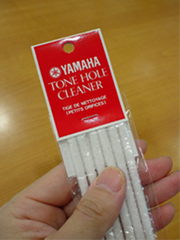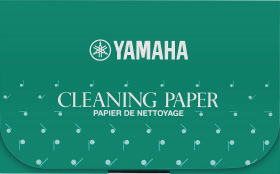Care and Maintenance of an Oboe
How to use maintenance paraphernalia
Key oil is essential
Key oil is essential for woodwind instruments. Despite this, a surprisingly small number of musicians properly apply key oil. Because the keys are the most important part of a woodwind instrument, be sure to make it a habit to properly oil them.
Key oil acts to protect the metallic surfaces of the keys. When key oil is applied, the oil spreads out in a thin layer between metal and metal, creating a membrane of oil. This oil membrane provides lubrication so that the different pieces of metal can move smoothly without touching one another directly. Less friction will result in less scratching of the metal, reducing abrasion. Furthermore, the membrane protects the metal from moisture and air, preventing corrosion and rusting.

Use light oil for your oboe.
Another problem that occurs from neglecting to oil the instrument is that metal pieces directly rub against one another when the keys are moving, producing unwanted noise. If the problem gets even worse, then the keys will get loose and will no longer cover the holes properly. Once it gets this bad, considerable repairs will be required, so be careful. Be sure to apply key oil around once per month-around once every two weeks if your hands tend to sweat.
Yamaha produces three types of key oil. Light oil is for instruments such as the piccolo, the flute, and the oboe. Medium oil is for clarinets. Heavy oil is for instruments such as the saxophone, the bass clarinet, and the bassoon. The viscosity differs among the different types of oil, so be sure to use the correct type.
Be careful not to apply too much cork grease!
Care must be taken not to apply too much of the cork grease rubbed on the corks at the joints of woodwind instruments: Applying too much cork grease will attract more dust and may cause weakening of the cork.
As a guide, it should be enough to apply the grease whenever the instrument seems too stiff during assembly. There is no need to apply the grease if the instrument is not stiff. Especially with stick-type grease, it is good to rub the grease into the cork by spreading it around with your finger after applying. After disassembling an instrument that you have finished playing, wipe away the grease before putting the instrument in its case. Make a habit of this.

Cork grease
If too much cork grease has been applied, has degraded, and is now stubbornly sticking to the instrument, it is fine to clean the surface of the cork once with a piece of tissue paper soaked in new grease.
As there is otherwise a danger of dropping the lower portion of the instrument if you hold only the upper portion, periodically change out blackened, squashed corks.
Clean every corner with your tone-hole cleaner!
Use a dedicated tone-hole cleaner to maintain your oboe's tone holes. The core of a tone-hole cleaner is made from wire, which is wrapped in a surface that is soft like chenille fabric. The tool is bent into a shape that makes it easier to use, which is done by inserting the cleaner into the instrument through the tone holes. The edges of tone holes inside the pipes of woodwind instruments tend to accumulate fine dust when swabs are passed through, so clean those parts especially thoroughly.
This is not the only use for a tone-hole cleaner. The areas around the keys on the exterior of a woodwind have a lot of complicated, uneven patches, so the cleaner can be put to considerable use removing the dust that has accumulated in these pockets. Dust tends to stick to the areas around the keys because of the use of key oil. If this dust is not cleaned away, it will affect the movement of the keys, changing the feel of how the instrument plays. In the worst-case scenario, foreign matter might get caught, or the lids of the keys might stop closing, which would require maintenance. Try to remove as much dust as possible at all times.

Tone-hole cleaners.
Completely soak up all moisture on the pads with cleaning paper!
The pads are crucial parts that play the role of perfectly sealing the tone holes when the keys are pressed. They are extremely delicate, deteriorating from moisture and the passage of time. Therefore, they must be replaced once every few years. However, if proper care is taken of them, then the pads will function their best during performances and will last longer.
The largest factor that decreases the lifespan of pads is moisture. Pads will quickly deteriorate if they are left in a damp state for long periods of time. Therefore, it is important to wipe away the moisture soaked up by the pads after a performance before stowing an instrument in its case. Cleaning paper is used for this. Once the paper is placed between the pads and the tone holes and the keys are lightly pressed a few times, the paper will soak up moisture and oil. Not all the keys will necessarily be equally damp, so you only need to do this where you notice any wetness. If you notice any stickiness, you may place the instrument in its case with paper left sandwiched in.

Cleaning paper.
Musical Instrument Guide:Oboe Contents
Structure
How to Play
How the Instrument is Made
Choosing an Instrument
Trivia
- Why does the oboe lead the orchestra in tuning?
- Do the reeds have a front and a back?
- The keys recoil via springs!
- This is how the oboe and the cor anglais differ
- The charumera was the oboe's cousin
- You can reduce time spent breathing using circular-breathing techniques?
- The Wiener oboe that survived an existential crisis
- Oboe masterpieces: concertos
- Oboe masterpieces: chamber music
- What is the alto oboe?
- The heckelphone, which resembles the oboe
- The oboe is the bassoon's cousin
